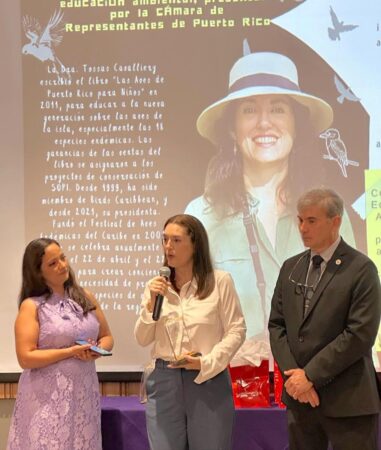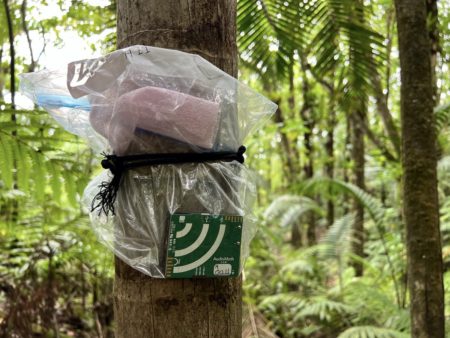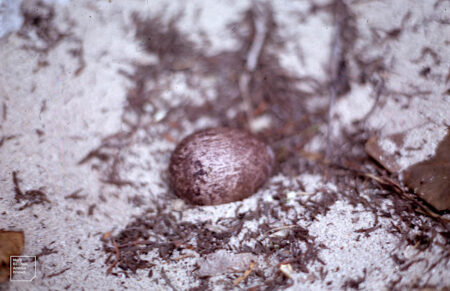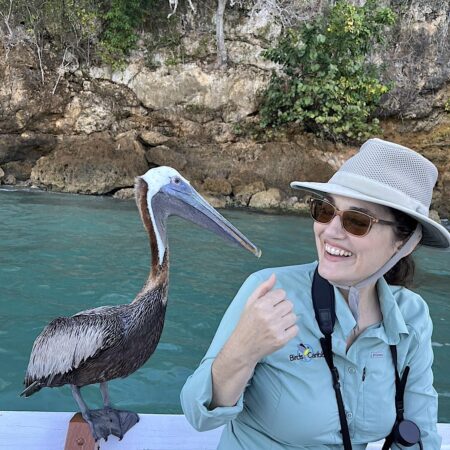We are happy and proud to congratulate our President Adrianne Tossas, who has received an Outstanding Women in STEAM award from the University of Puerto Rico for contributions to scientific research and education.

Adrianne was nominated by her peers to be part of the 4th Power of Women in Science symposium that took place at the main campus of the University of Puerto Rico in Río Piedras on March 31, 2023. The event celebrated the achievements of 25 women professors who excel in science, technology, engineering, art, and mathematics (STEAM). In a special ceremony, the Vice President for Research acknowledged the nominees representing the 11 campuses of the University of Puerto Rico, with a special recognition that was prepared and presented by young women from different local schools.
Adrianne has been a professor of biology at the University of Puerto Rico in Aguadilla since 2008. As part of this position, she has led about 200 students in their first research experiences through the Bird Ecology and Conservation Project. Through the course Introduction to Research she engages undergraduate students in bird monitoring and mentors them to apply for graduate programs. Every semester, small groups of 10 to 15 students receive training in bird identification techniques, surveying protocols, experiment design, scientific writing, and skills for oral presentations.
Here is more on our President’s work and achievements:
Landbird monitoring
In 2009 Adrianne Tossas started monitoring the avian community of Guajataca State Forest, a natural reserve in the northern karst region of the island. Point counts are conducted every spring, allowing for the assessment of 37 bird species, including 12 of Puerto Rico’s 18 endemic species. This 15-year comparison has shown population changes related to an extreme drought in 2015 and the passage of Hurricane María in 2017. The combined effects of both events caused a 10-20% difference in overall bird abundance from 2016 to 2018 compared to 2009-2015. Almost five years after the hurricane, the average number of individuals per count was still lower than baseline estimates.

A new monitoring project with AudioMoth digital recorders began in this forest in 2022, to assess the singing activity of bird species. Approximately 3,000 minutes per month were recorded in February, May, July and August 2022, and January- March 2023. The open-source software ARBIMON was used to analyze the findings of the most abundant species. The top-five most frequently detected were the Bananaquit (Coereba flaveola), Black-whiskered Vireo (Vireo altiquus) Puerto Rican Vireo (Vireo latimeri), Puerto Rican Bullfinch (Melospiza portoricensis), and Adelaide’s Warbler (Setophaga adelaidae). Ongoing data collection will permit comparing patterns over time.
Since the forest trails were inaccessible for almost a year after the passage of Hurricane María, Adrianne designed new projects in coastal areas to engage students in bird monitoring.
White-tailed Tropicbird

Since 2018 the group has been assessing the size and annual fluctuations of populations of the White-tailed Tropicbird (Phaeton lepturus) when they return from the sea to breed in the rocky cliffs of Quebradillas in northern Puerto Rico. This is the species’ only breeding site on the main island, since it is mostly known to nest on cays off the eastern coast. Biweekly surveys were conducted during the reproductive season, which extends from December to July, detecting a yearly average of 70 tropicbirds (range of 0 – 94 individuals). These data suggest that the population consists of approximately 50 breeding pairs; however, this number could be larger because the cliffs provide potential nesting sites beyond the study site. A count conducted along a broader extension of the cliff in February 2023 recorded a total of 206 individuals.
Brown Pelican

Since 2019 the group has been assessing the population status of the Caribbean Brown Pelican (Pelecanus occidentalis occidentalis) on the coast of Aguadilla. From 2019 to 2021, up to 49 individuals were counted in 38 monthly surveys, including adults with reproductive plumage and juveniles. In October 2021 the group found an active breeding colony with 53 nests in a steep cliff bordering the seashore. A second nesting season is currently under study. No surveys have taken place in this area since 1993, even though this is one of the only three pelican breeding sites in Puerto Rico. These data are helping local conservation groups to promote the creation of a new nature reserve in coastal Aguadilla.
We congratulate Adrianne on her inspiring work in science and education and on her well-deserved award!





One comment
Comments are closed.